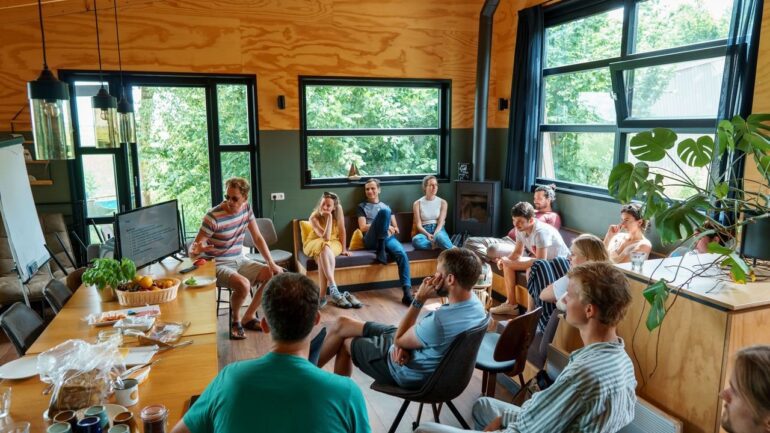TL;DR:
- Dutch startup Cradle secures $24 million in Series A funding, bringing total funding to $33 million.
- Cradle employs generative AI to empower scientists in protein design without the need for bioinformaticians or ML engineers.
- Their software removes data roadblocks, facilitating the integration of Generative AI and ML tools for faster R&D.
- Proprietary generative AI models trained on billions of protein sequences and in-house data.
- Collaborations with industry leaders, including Johnson & Johnson Innovation, Novozymes, and Twist Bioscience.
- Focus on engineering various protein types, accelerating design and optimization with impressive success rates.
- Funding is led by Index Ventures with participation from Kindred Capital and notable angel investors.
- Plans to accelerate growth, expand teams, and invest in product development and sales capabilities.
Main AI News:
In a significant stride towards revolutionizing the realm of biotechnology, Dutch startup Cradle has successfully secured $24 million in Series A funding, bringing its total funding to an impressive $33 million. This substantial investment is set to catapult Cradle’s mission to empower scientists in designing and engineering proteins through the utilization of generative AI. The company has developed user-friendly web-based software, eliminating the need for bioinformaticians or machine learning engineers, thus democratizing access to cutting-edge technology.
Cradle’s innovative software addresses the perennial challenge of data accessibility within biotechnology companies. Doing so paves the way for the seamless integration of Generative AI and Machine Learning tools, greatly expediting research and development pipelines. At the core of Cradle’s capabilities lie its proprietary generative AI models, meticulously trained on an extensive dataset comprising billions of protein sequences, alongside data generated within its own wet laboratory.
The year 2022 marked a pivotal moment for Cradle as it stepped out of stealth mode and welcomed nine leading industry partners into its fold, including giants like Johnson & Johnson Innovation, Novozymes, and Twist Bioscience. Presently, Cradle is actively collaborating with more than a dozen research and development projects, all focused on the engineering of various protein modalities. These encompass enzymes, vaccines, peptides, and antibodies, spanning a wide spectrum of desired protein attributes, such as stability, expression, activity, binding affinity, and specificity.
The tangible results achieved so far underscore the transformative potential of Cradle’s technology. It significantly expedites the design and optimization of proteins, reducing the need for numerous experiments while enhancing their success rate. Remarkably, most projects progress at twice the speed compared to industry benchmarks. Moreover, Cradle’s generative AI capabilities unlock solutions to protein engineering challenges that elude human comprehension using existing tools, thus increasing the likelihood of success in specific R&D programs.
Index Ventures leads the funding round, with participation from Kindred Capital. Eminent angel investors, including Chris Gibson, co-founder and CEO of Recursion, and Tom Glocer, former CEO of Thomson Reuters and Lead Director at Merck, have also joined in.
Cradle plans to utilize the newfound funds to accelerate its growth trajectory, expand its machine learning and biotech team, and continue investing in product development and sales capabilities.
Stef van Grieken, Cradle’s CEO and co-founder, expressed his enthusiasm, stating, “Biological products are one of the biggest tools we can deploy to improve health outcomes and reduce the environmental impact of human consumption. By using generative AI and machine learning to help biologists design and optimize proteins faster and more efficiently, we can help research and development teams innovate faster, spend less, and ultimately be more successful in developing new products. In the last year, we’ve been focused on demonstrating that our technology can deliver meaningful results and initiating partnerships with a number of true industry leaders. We’re thrilled with the progress to date and are excited to have closed our Series A, which gives us everything we need to build on this momentum, accelerate our growth, and onboard more customers to our platform.”
Sofia Dolfe, a Partner at Index Ventures, commented on the groundbreaking potential of AI in biology, emphasizing how it could address some of the most pressing health and climate challenges. She noted that early results from Cradle’s technology have already demonstrated its capacity to accelerate innovation significantly, ultimately reshaping the production of consumer goods. Dolfe also lauded Cradle’s rapid expansion to meet burgeoning customer demand, underlining Cradle’s pivotal role in advancing the emerging field of programming biology.
Conclusion:
Cradle’s substantial funding and pioneering AI-driven protein design technology position them at the forefront of biotechnology innovation. This development signifies a growing trend in the market towards leveraging AI and machine learning for enhanced research and development capabilities, ultimately reshaping the biotech industry’s approach to protein engineering and accelerating the pace of innovation.

